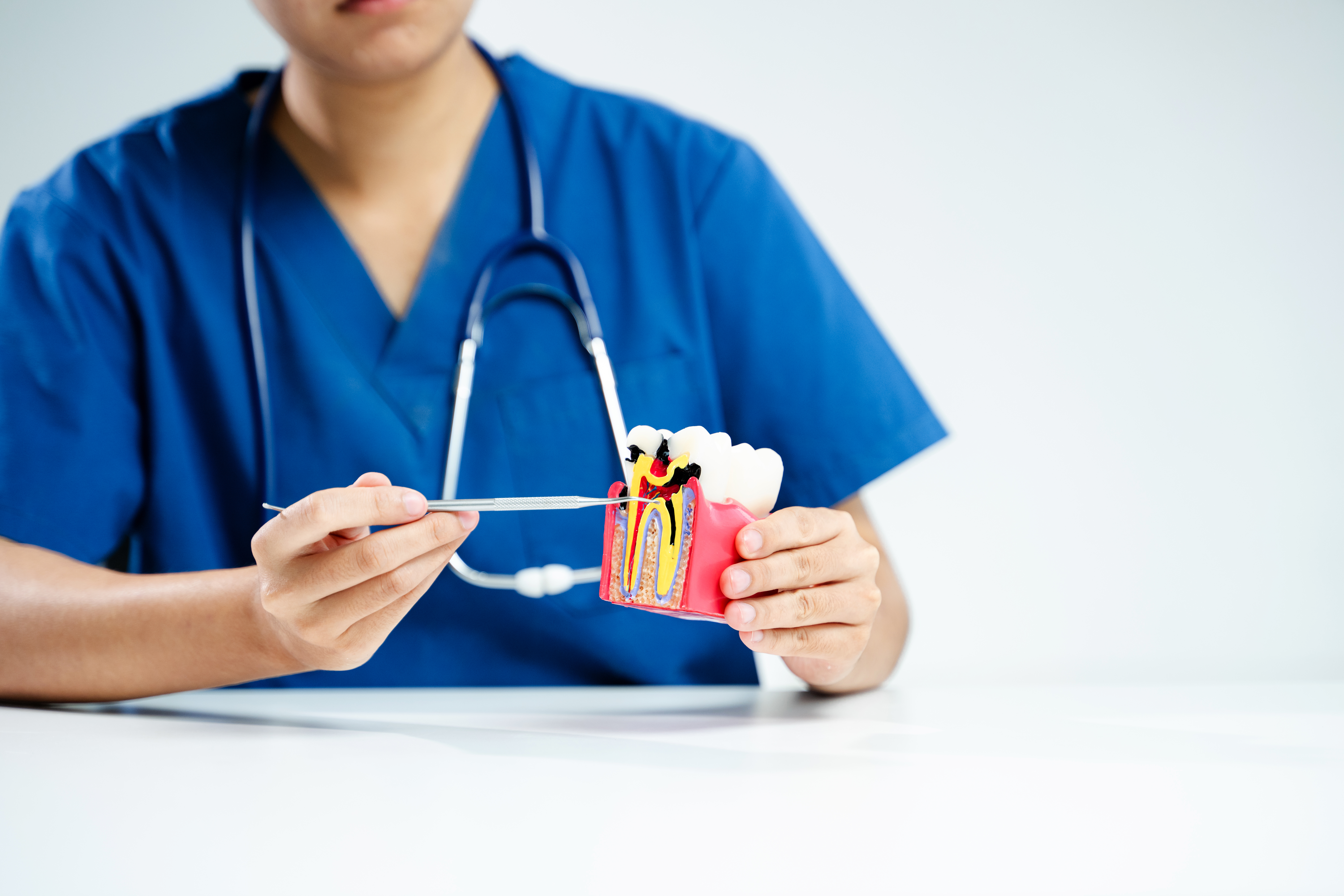Do you ever notice people stepping back during conversations or reacting unexpectedly when you lean in for a goodbye kiss?
If so, you might be dealing with bad breath.
Bad breath, or halitosis, is a common concern that can affect anyone at any time. Sometimes, it’s much more than an embarrassing social problem; it can signal underlying health issues.
In this post, we’ll break down what causes bad breath, dispel some myths, and share effective fresh breath tips to manage or prevent it.
Understanding Bad Breath
If you’ve ever caught yourself wondering, ‘Why do I have bad breath?’, we have answers for you:
- Poor Oral Hygiene
If you’re not brushing or flossing regularly, leftover food in your mouth can decay and breed odor-causing bacteria.
- Food and Drinks
Certain foods and drinks are infamous for their lingering smells. Garlic, onions, and spices can leave a residual odor that persists even after brushing. Coffee and alcohol can also change how your breath smells by drying out your mouth and reducing saliva production.
- Tobacco Products
Smoking or using other tobacco products is a surefire way to sour your breath. Besides leaving their own odor, tobacco products dry out your mouth and can lead to gum disease, both of which can make bad breath even worse.
- Dry Mouth
Saliva plays an essential role in oral health by helping to cleanse the mouth and digest food particles. A lack of saliva (xerostomia) can lead to a dry mouth, which is a common cause of bad breath. Dry mouth may be caused by various factors, including medication side effects, mouth breathing , or salivary gland issues.
- Medical Conditions
Chronic medical problems like sinus infections, Gastroesophageal Reflux Disease (GERD,) and diabetes can alter your body’s metabolism and, in turn, your breath.
- Oral Infections and Dental Issues
Sometimes, bad breath can result from dental issues like periodontal disease or cavities. In these conditions, bacteria builds up in pockets at your tooth bases or in cavities and leads to unpleasant odors. Regular visits to the dentist can help catch and treat these problems early.
Common Misconceptions About Bad Breath
Bad breath is surrounded by myths that can often lead to unnecessary worry and incorrect treatments. Let’s address and bust some of these misconceptions:
- Bad Breath Cannot be Prevented
Many believe bad breath is inevitable, but this is simply not true. You can effectively manage or prevent most cases of bad breath with good oral hygiene, a proper diet, and regular dental check-ups.
- Mouthwash Alone Can Fix It
While using mouthwash is a good practice, it’s not a cure-all for bad breath. It can temporarily mask odors but doesn’t address underlying issues like dental decay, gum disease, or other medical conditions.
- Bad Breath Means Poor Health
While persistent bad breath can be a sign of health issues, sometimes the solution is as simple as hydrating more or improving your oral hygiene.
- Bad Breath is a Rare and Embarrassing Flaw
Many believe that bad breath is a personal failing or an uncommon issue, which can lead to significant embarrassment and social anxiety. Some people may even avoid close contact or intimate situations due to fear of their breath being noticeable.
The social stigma around bad breath can deter individuals from discussing the problem openly. But in all honesty, bad breath is a widespread issue that affects most people at different times in their lives. You must recognize that it’s not a reflection of your character or hygiene habits alone.
Preventative Measures for Bad Breath
A little proactivity can go a long way in halitosis treatment and managing bad breath. Here are a few practical preventative measures you can take to keep your breath fresh and improve your overall oral health.
Good Oral Hygiene Practices
Good oral hygiene is key to fighting bad breath. Here are some tips:
- Brush Twice a Day
Use fluoride toothpaste to brush your teeth after every meal or at least twice a day. Doing this helps get rid of food particles and plaque.
- Floss Daily
Make sure to floss daily to eliminate food debris from areas your toothbrush might miss, such as between your teeth or under the gum line.
- Use Mouthwash
Add an antibacterial mouthwash to your routine to decrease the bacteria responsible for bad breath and give your mouth a fresher feel.
Diet and Lifestyle Changes
Your diet and lifestyle choices significantly impact your breath quality:
- Watch What You Eat
As mentioned, foods like garlic, onions, and coffee can leave a lasting smell. Try to eat these foods in moderation and brush your teeth or rinse your mouth afterward.
- Stay Hydrated
Drink plenty of water throughout the day to keep your mouth moist. Water helps produce saliva, clean the mouth, and reduce dryness-related bad breath.
- Quit Smoking and Limit Alcohol
Smoking and heavy drinking contribute to dry mouth and can add unpleasant smells. Quitting smoking and reducing alcohol consumption can greatly improve your breath and overall oral health.
Regular Dental Checkups
Regular dental checkups are crucial to keeping your breath fresh and your mouth healthy. Here’s how to make the most of them:
- Schedule Visits Regularly
Aim to visit your dentist at least twice a year for professional cleanings. During these sessions, your dentist will remove tartar and build-up that brushing alone can’t clear.
- Get Evaluated
Your dentist will check for signs of periodontal disease, dental decay, and other issues that could lead to bad breath during each visit. Catching these problems early can save you from bigger issues down the line.
- Follow Your Dentist’s Advice
After your check-up, your dentist might give you specific advice and bad breath solutions to improve your oral health. Make sure to follow their recommendations to keep your breath fresh and your teeth healthy.
Addressing Underlying Medical Conditions
If you’re dealing with persistent bad breath, it might be a sign of a more serious health issue.
- Consult a Healthcare Provider
Sometimes, your bad breath may continue even when you maintain good oral hygiene and make lifestyle changes. In such cases, it’s important to see a healthcare professional. They can help determine if a condition like diabetes, GERD, or an oral infection is contributing to the problem.
- Follow Medical Advice
Your physician will likely come up with a treatment plan to help manage your condition. Make sure you follow their advice closely to keep bad breath in check.
- Regular Follow-Ups
Stay on top of regular check-ups to keep track of your condition and adjust your treatments as needed. This can help you manage your overall health and any issues with bad breath effectively.
Practical Advice for Addressing Bad Breath
Bad breath can be a nuisance, but there are several practical steps you can take to address it both immediately and in the long term. The dentists at Yonge Eglinton Dental have compiled a quick guide on how to tackle bad breath with effective solutions.
Immediate Solutions
If you need a quick bad breath cure, consider these options:
- Chewing Sugar-Free Gum or Mints
One of the quickest ways to freshen your breath is by chewing sugar-free gum or sucking on sugar-free mints. Not only do these mask unpleasant odors, but they also stimulate saliva production.
- Drinking Water to Stay Hydrated
Staying hydrated is essential for maintaining good oral health. Make it a habit to sip water throughout the day, especially after meals and snacks.
- Using Breath Freshening Sprays
Breath freshening sprays can mask bad breath on the go and offer a temporary solution during social events or meetings.
Long-Term Strategies
To combat mouth odor in the long term, integrate these habits into your daily routine:
- Maintaining a Balanced Diet
Eating healthy foods contributes to better overall health and aids in digestion, which can help prevent bad breath. You should also avoid excessive sugary or acidic foods to protect your teeth and gums.
- Regular Tongue Cleaning
A lot of bacteria reside on the tongue. Clean your tongue regularly with a tongue scraper to remove this build-up and significantly reduce mouth odors.
- Using a Humidifier
If you suffer from dry mouth, especially during the night, using a humidifier in your bedroom can help maintain moisture in the air and prevent the conditions that lead to bad breath.
When to See a Professional
Chronic bad breath disease can be a sign of a more serious condition. If home remedies aren’t working, it’s a good idea to see a healthcare professional. A dentist can identify any oral health issues contributing to bad breath, while a doctor can check for any systemic issues that might be the cause.
Over to You
Remember, you’re not alone in dealing with bad breath, and it’s usually something that can be managed with a few simple changes. We hope this post has given you the tools you need to fight bad breath and maintain good oral health.
Take the first step towards fresher breath today, and don’t hesitate to reach out for professional help if needed. Your breath—and your confidence—will thank you!
At Yonge Eglinton Dental, we’re committed to helping you achieve both a healthy smile and fresh breath. Whether you need a routine check-up or have concerns about halitosis, our team of dentists and dental specialists is here to support you. Call 416-932-2222 or visit our website today to book your appointment.








